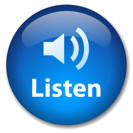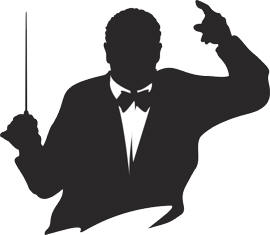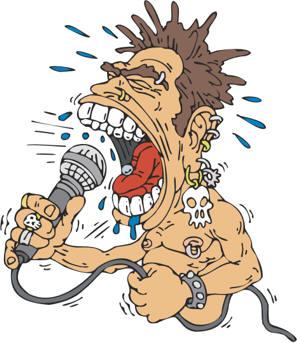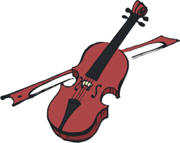Music, the
Brain and Your Health
By Barrington
H. Brennen, August 7, 2013, 2026
PDF Format

 Many are not aware how powerful music is and how it
impacts brain development and
behavior. In this article
I will present a number of quotations from experts on
the effects of music on the brain, behavior and
health. Napoleon Bonaparte understood the enormous
power of music. He summed it up by saying, “Give me
control over he who shapes the music of a nation, and I
care not who makes the laws.” Some ancient Chinese
Emperors measured the health of a Chinese village by the
quality of the music.
Many are not aware how powerful music is and how it
impacts brain development and
behavior. In this article
I will present a number of quotations from experts on
the effects of music on the brain, behavior and
health. Napoleon Bonaparte understood the enormous
power of music. He summed it up by saying, “Give me
control over he who shapes the music of a nation, and I
care not who makes the laws.” Some ancient Chinese
Emperors measured the health of a Chinese village by the
quality of the music.
It has been proven that music influences humans both in
good and bad ways. These effects are instant and long
lasting. Music is thought to link all of the emotional,
spiritual, and physical elements of the universe. Music
can also be used to change a person's mood, and has been
found to cause like physical responses in many people
simultaneously. Music also has the ability to strengthen
or weaken emotions from a particular event such as a
funeral.” "Babies can even interpret the emotional
contents of a piece of music." "They can recognise
happiness, anger and sadness," Prof. Trevarthan is
reported as saying. Babies show a preference for light,
gentle and joyful sounds. They are not apparently keen
on rock music because "it is too passionate and
frightens them." Dr. James Le Fann
Albert's Einstein parents bought him a violin. Albert
became good at the violin. Music was the key that helped
Albert Einstein become one of the smartest men who has
ever lived. Einstein himself says that the reason he was
so smart is because he played the violin. He loved the
music of Mozart and Bach the most.” Ancient Greek
philosopher, Plato said "Music is a moral law. It gives
soul to the universe, wings to the mind, flight to the
imagination, a charm to sadness, gaiety and life to
everything. It is the essence of order and lends to all
that is good and just and beautiful.”
 Hungary, Japan, and the Netherlands, the top three
academic countries in the world, all place a great
emphasis on music education and participation in music.
It is interesting to note that the top engineers from
Silicon Valley are all musicians. It is important to
note that the kind of music these engineers listen to
are classical to inspirational music.
Hungary, Japan, and the Netherlands, the top three
academic countries in the world, all place a great
emphasis on music education and participation in music.
It is interesting to note that the top engineers from
Silicon Valley are all musicians. It is important to
note that the kind of music these engineers listen to
are classical to inspirational music.
SLOW MUSIC AND PHYSICAL HEALTH
Music affects us physically. A quick example of this is
that our heart beat, respiration and brain waves all
entrain, or synchronize with different rhythms. Slow
music tends to slow down our heart rate respiration and
brain waves. Fast music has the opposite effect, tending
to speed us up.” Music therapy is the prescribed use
of music and musical interventions in order to restore,
maintain, and improve emotional, physical,
physiological, and spiritual health and well-being.
Music therapists work towards a number of non- musical
goals including improving communication skills,
decreasing inappropriate behavior, improving academic
and motor skills, increasing attention span,
strengthening social and leisure skills, pain management
and stress reduction. Music therapy can also help
individuals on their journey of self-growth and
understanding.
An Australian physician and psychiatrist, Dr. John
Diamond, found a direct link between muscle
strength/weakness and music. He discovered that all of
the muscles in the entire body go weak when subjected to
the "stopped anapestic beat" of music from hard rock
musicians, including Led Zeppelin, Alice Cooper, Queen,
The Doors, Janis Joplin, Bachman - Turner Overdrive, and
The Band. Dr. Diamond found another effect of the
anapestic beat. He called it a "switching" of the
brain.”
Research by Costas Karageorghis, a sports psychologist
at Brunel University, suggests that the right music can
lift a person’s athletic performance by as much as 20
per cent. Dr Karageorghis found that athletes who ran
while listening to “synchronous” music — when the beats
fitted with the rhythm of body movement — could endure a
fifth more exertion than those without.
LOUD MUSIC
"Loud music stimulates a part of the ear connected to
the brain's pleasure centre which controls the body's
craving for sex and food.” People's response to the
thumping beat of pop music is controlled by a tiny organ
in the inner ear called the sacculus which till now was
thought to have nothing to do with any hearing function.
The sacculus normally controls a person's sense of
balance but is also sensitive to noises above 90
decibels. When the volume of a sound is turned up it
generates vibrations that are picked up by the sacculus.
The distribution of frequencies that are typical in rock
concerts and at dance clubs almost seem designed to
stimulate the sacculus. Dr. Neil Todd, an expert in
music perception. University of Manchester.
controls the body's
craving for sex and food.” People's response to the
thumping beat of pop music is controlled by a tiny organ
in the inner ear called the sacculus which till now was
thought to have nothing to do with any hearing function.
The sacculus normally controls a person's sense of
balance but is also sensitive to noises above 90
decibels. When the volume of a sound is turned up it
generates vibrations that are picked up by the sacculus.
The distribution of frequencies that are typical in rock
concerts and at dance clubs almost seem designed to
stimulate the sacculus. Dr. Neil Todd, an expert in
music perception. University of Manchester.
CLASSICAL MUSIC, EDUCATION & LEARNING
Responses to music are easy to be detected in the human
body. Classical music from the baroque period causes the
heart beat and pulse rate to relax to the beat of the
music. As the body becomes relaxed and alert, the mind
is able to concentrate more easily. Furthermore,
baroque music decreases blood pressure and enhances the
ability to learn. Music affects the amplitude and
frequency of brain waves, which can be measured by an
electro- encephalogram. Music also affects breathing
rate and electrical resistance of the skin. It has been
observed to cause the pupils to dilate, increase blood
pressure, and increase the heart rate.
 Preschoolers who studied piano performed 34% better in
spatial and temporal reasoning ability than preschoolers
who spent the same amount of time learning to use
computers. -Rauscher and Shaw, as reported in
Neurological Research, February 1997. Listening to
music can increase levels of interleukin-1 (IL-1) in the
blood from 12.5 to 14%. Interleukins are a family of
proteins associated with blood and platelet production,
lymphocyte stimulation and cellular protection against
AIDS, cancer, and other diseases. - Michigan State
University. For the unborn Child, classical music,
played at a rhythm of 60 beats per minute, equivalent to
that of a resting human heart, provides an environment
conductive to creative and intellectual development. -Dr
Thomas Verny, The Secret Life of the Unborn Child
Preschoolers who studied piano performed 34% better in
spatial and temporal reasoning ability than preschoolers
who spent the same amount of time learning to use
computers. -Rauscher and Shaw, as reported in
Neurological Research, February 1997. Listening to
music can increase levels of interleukin-1 (IL-1) in the
blood from 12.5 to 14%. Interleukins are a family of
proteins associated with blood and platelet production,
lymphocyte stimulation and cellular protection against
AIDS, cancer, and other diseases. - Michigan State
University. For the unborn Child, classical music,
played at a rhythm of 60 beats per minute, equivalent to
that of a resting human heart, provides an environment
conductive to creative and intellectual development. -Dr
Thomas Verny, The Secret Life of the Unborn Child
The power of music to affect memory is quite intriguing.
Mozart's music and baroque music, with a 60 beats per
minute beat pattern, activate the left and right brain.
The simultaneous left and right brain action maximizes
learning and retention of information. The information
being studied activates the left brain while the music
activates the right brain. Also, activities which engage
both sides of the brain at the same time, such as
playing an instrument or singing, causes the brain to be
more capable of processing information. Dr. George
Lozanov of The Center for New Discoveries in Learning
states that learning potential can be increased a
minimum of five times by using this 60 beats per minute
music. For example, the ancient Greeks sang their dramas
because they understood how music could help them
remember more easily.
MUSIC AND MENTAL HEALTH
Dr. Ardash Kumar, research associate professor in the
department of psychiatry and behavioral sciences at the
University of Miami School of Medicine in Florida states
that “A month-long course of music therapy improved
behavior and sleeping problems in a group of Alzheimer's
patients.” Blood analyses indicated that a significant
increase in blood melatonin levels occurred after
participation in music therapy sessions and that the
increase continued even after the therapy had been
discontinued for 6 weeks. Levels of epinephrine and norepinephrine are elevated.
Dear reader, let wholesome music be a part of your
live. Listen to it. Learn it. Sing it. Let your music
choice include a variety—religious, classical and
inspirational music.
Barrington H. Brennen is a marriage and family therapist, and board
certified clinical
psychotherapist, USA. Send your questions or comments to
question@soencouragement.org
or write to P.O. Box CB-11045, Nassau, The Bahamas, or
call 1-242-327-1980.